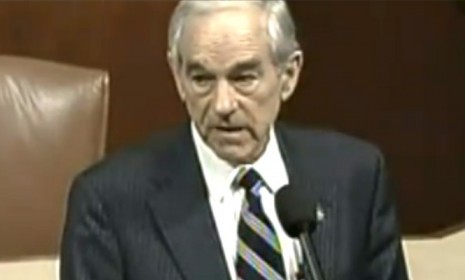Ron Paul's 'passionate' WikiLeaks defense
Breaking away from the D.C. party line on WikiLeaks, the libertarian Texas Republican says secrecy is more dangerous than Julian Assange

A free daily email with the biggest news stories of the day – and the best features from TheWeek.com
You are now subscribed
Your newsletter sign-up was successful
The video: While most of Washington condemns WikiLeaks, Rep. Ron Paul (R-Texas) has delivered a "passionate" defense of the anti-secrecy website and its founder, Julian Assange. (View clip below.) Paul said recently on the House floor that treating Assange as a spy for releasing secret U.S. diplomatic cables was like "killing the messenger for bringing bad news." The libertarian iconoclast concluded his address with nine questions, including, "Which has resulted in the greatest number of deaths: Lying us into war or WikiLeaks' revelations...?"
The reaction: Thank goodness someone in Washington is "standing up for transparency," says John Nichols in The Nation. We should be afraid of "state secrecy," not of knowing the truth about what our government is doing. Ron Paul raises "some excellent questions," says Andrea Reiher in Zap2It. He's not rallying a majority to Assange's defense, but he made "a powerful statement" that went "against the opinion held by his own party." Watch him speak for yourself:
A free daily email with the biggest news stories of the day – and the best features from TheWeek.com
The Week
Escape your echo chamber. Get the facts behind the news, plus analysis from multiple perspectives.

Sign up for The Week's Free Newsletters
From our morning news briefing to a weekly Good News Newsletter, get the best of The Week delivered directly to your inbox.
From our morning news briefing to a weekly Good News Newsletter, get the best of The Week delivered directly to your inbox.
-
 5 blacked out cartoons about the Epstein file redactions
5 blacked out cartoons about the Epstein file redactionsCartoons Artists take on hidden identities, a censored presidential seal, and more
-
 How Democrats are turning DOJ lemons into partisan lemonade
How Democrats are turning DOJ lemons into partisan lemonadeTODAY’S BIG QUESTION As the Trump administration continues to try — and fail — at indicting its political enemies, Democratic lawmakers have begun seizing the moment for themselves
-
 ICE’s new targets post-Minnesota retreat
ICE’s new targets post-Minnesota retreatIn the Spotlight Several cities are reportedly on ICE’s list for immigration crackdowns